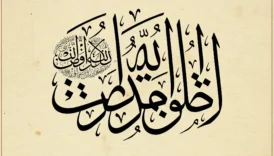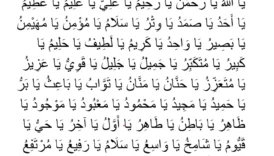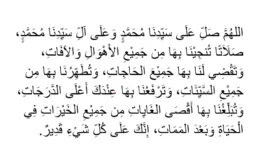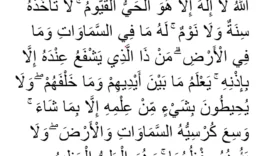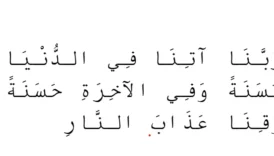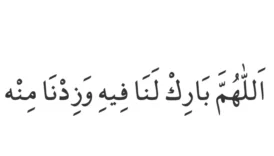What Is the Forty Locks (Forty Keys) Prayer?
The Forty Locks Prayer—also referred to as the Forty Keys Prayer—is a well-known supplication in some Islamic traditions. According to certain narratives, it was compiled by Lady Fāṭima (may Allah be pleased with her) from specific verses of the Holy Qur’an, arranged in a particular sequence. People recite it with the intention of “opening the doors of goodness and closing the doors of evil.” It is commonly associated with seeking blessings in marriage, family harmony, livelihood, protection from sorcery, and the removal of spiritual obstacles.
For a Blessed Marriage and Family Harmony
- How to Recite:
- Typically performed on Thursday or Friday mornings, after the Dawn (Fajr) prayer.
- The Forty Locks Prayer is recited over a container of water (often a blue bowl).
- Afterward, reciting Sūrat Yā Sīn once is strongly recommended.
- You drink some of this blessed water and then use the remainder for a full ritual bath (ghusl).
- This process is repeated for four consecutive weeks.
- Enhancing Marital Affection:
- For strengthening love between spouses or resolving marital disputes, the prayer is recited over water, tea, or juice.
- Both spouses should drink from the blessed liquid.
For Opening One’s Fortune and Nullifying Sorcery
- Undoing Spells & Removing Barriers:
- The same prayer is recited over a sufficient amount of water for someone who is believed to be under the influence of sorcery or facing blockages in personal affairs (e.g., marital, financial, or spiritual).
- The person then performs a ghusl with this water, believing it will lift any malicious effects.
- Using Saffron Ink:
- A traditional practice considered highly effective is to write the Arabic text of the Forty Locks Prayer onto paper with saffron ink, dissolve the ink fully in water, and then bathe (or perform a ritual washing) with that water.
Complete Text of the Forty Locks Prayer
Below is the 1) Original Arabic Text, 2) Transliteration, and 3) English Rendering (Meaning) presented as one comprehensive prayer. Please note:
- No Arabic text and transliteration appear on the same line.
- Each Arabic phrase is followed on a new line by its transliteration, then another new line for the English meaning (where relevant).
- Verses are arranged according to a specific tradition. The final section includes a list of Qur’anic references in the order they appear.
1) Arabic Text
بِسْمِ اللَّهِ الرَّحْمَنِ الرَّحِيمِ
إِنَّا فَتَحْنَا لَكَ فَتْحًا مُّبِينًا سَلَامٌ عَلَيْكُمْ طِبْتُمْ فَادْخُلُوهَا خَالِدِينَ لَقَدْ جَاءَكُمْ رَسُولٌ مِّنْ أَنْفُسِكُمْ عَزِيزٌ عَلَيْهِ مَا عَنِتُّمْ حَرِيصٌ عَلَيْكُمْ بِالْمُؤْمِنِينَ رَؤُوفٌ رَّحِيمٌ رَبَّنَا مَا خَلَقْتَ هَٰذَا بَاطِلًا سُبْحَانَكَ فَقِنَا عَذَابَ النَّارِ وَتِلْكَ حُجَّتُنَا آتَيْنَاهَا إِبْرَاهِيمَ عَلَىٰ قَوْمِهِ نَرْفَعُ دَرَجَاتٍ مَّن نَّشَاءُ إِنَّ رَبَّكَ حَكِيمٌ عَلِيمٌ وَقُلْ جَاءَ الْحَقُّ وَزَهَقَ الْبَاطِلُ إِنَّ الْبَاطِلَ كَانَ زَهُوقًا وَنُنَزِّلُ مِنَ الْقُرْآنِ مَا هُوَ شِفَاءٌ وَرَحْمَةٌ لِّلْمُؤْمِنِينَ وَلَا يَزِيدُ الظَّالِمِينَ إِلَّا خَسَارًا قُلْنَا يَا نَارُ كُونِي بَرْدًا وَسَلَامًا عَلَىٰ إِبْرَاهِيمَ وَأَرَادُوا بِهِ كَيْدًا فَجَعَلْنَاهُمُ الْأَخْسَرِينَ وَذَا النُّونِ إِذْ ذَهَبَ مُغَاضِبًا فَظَنَّ أَن لَّن نَّقْدِرَ عَلَيْهِ فَنَادَىٰ فِي الظُّلُمَاتِ أَن لَّا إِلَٰهَ إِلَّا أَنتَ سُبْحَانَكَ إِنِّي كُنتُ مِنَ الظَّالِمِينَ وَلَا تُمْسِكُوا بِعِصَمِ الْكَوَافِرِ وَأُلْقِيَ السَّحَرَةُ سَاجِدِينَ وَمِنَ النَّاسِ مَن يَتَّخِذُ مِن دُونِ اللَّهِ أَندَادًا يُحِبُّونَهُمْ كَحُبِّ اللَّهِ وَالَّذِينَ آمَنُوا أَشَدُّ حُبًّا لِّلَّهِ . بَیَّنَاهَا بَیْنَ آدَمَ وَحَوَّاءَ وَبَیْنَ یُوسُفَ وَفَاطِمَةَ الزَّهْرَاءَ وَعَلِیٌّ الْمُرْتَضَى . وَبِحَقِّ مُحَمَّدٍ الْمُصْطَفَى صَلَّى اللَّهُ عَلَیْهِ وَآلِهِ . وَبِحَقِّ جِبْرَئِیلَ وَمِیکَائِیلَ وَإِسْرَافِیلَ وَعِزَائِیلَ . یَا حَنَّانُ یَا مَنَّانُ یَا دَیَّانُ یَا بُرْهَانُ یَا رِضْوَانُ یَا سُلْطَانُ یَا غُفْرَانُ . بِسْمِ اللَّهِ الرَّحْمَنِ الرَّحِیمِ إِذَا جَاءَ نَصْرُ اللَّهِ وَالْفَتْحُ وَرَأَیْتَ النَّاسَ یَدْخُلُونَ فِی دِینِ اللَّهِ أَفْوَاجًا فَسَبِّحْ بِحَمْدِ رَبِّكَ وَاسْتَغْفِرْهُ إِنَّهُ كَانَ تَوَّابًا نَصْرٌ مِّنَ اللَّهِ وَفَتْحٌ قَرِیبٌ وَبَشِّرِ الْمُؤْمِنِینَ یَا أَیُّهَا الَّذِینَ آمَنُوا قُلْ هُوَ اللَّهُ أَحَدٌ اللَّهُ الصَّمَدُ لَمْ یَلِدْ وَلَمْ یُولَدْ وَلَمْ یَكُن لَّهُ كُفُوًا أَحَدٌ لَیْسَ كَمِثْلِهِ شَیْءٌ وَهُوَ السَّمِیعُ الْبَصِیرُ قُلْ أَعُوذُ بِرَبِّ الْفَلَقِ مِن شَرِّ مَا خَلَقَ وَمِن شَرِّ غَاسِقٍ إِذَا وَقَبَ قُلْ أَعُوذُ بِرَبِّ النَّاسِ قُلْ كَفَىٰ بِاللَّهِ شَهِیدًا بَیْنِی وَبَیْنَكُمْ وَقُلْ جَاءَ الْحَقُّ وَزَهَقَ الْبَاطِلُ إِنَّ الْبَاطِلَ كَانَ زَهُوقًا قُلْ یَجْمَعُ بَیْنَنَا رَبُّنَا ثُمَّ یَفْتَحُ بَیْنَنَا بِالْحَقِّ وَهُوَ الْفَتَّاحُ الْعَلِیمُ قُلْ أَرَأَیْتُمْ إِنْ أَهْلَكَنِیَ اللَّهُ وَمَن مَّعِیَ أَوْ رَحِمَنَا فَمَن یُجِیرُ الْكَافِرِینَ مِنْ عَذَابٍ أَلِیمٍ قُلْ أَرَأَیْتُمْ إِنْ أَصْبَحَ مَاؤُكُمْ غَوْرًا فَمَن یَأْتِیكُم بِمَاءٍ مَّعِینٍ قُلْنَا یَا نَارُ كُونِی بَرْدًا وَسَلَامًا عَلَىٰ إِبْرَاهِیمَ قُلْ یَا أَیُّهَا الْكَافِرُونَ لَا أَعْبُدُ مَا تَعْبُدُونَ قُلْ كُونُوا قِرَدَةً خَاسِئِینَ قُلْ سِیرُوا فِی الْأَرْضِ ثُمَّ انظُرُوا كَیْفَ
2) Transliteration
Bismillâhirrahmânirrahîm
innâ fetahnâ leke fethan mubînâ salâmun aleykum tibtum fedkhulûhâ hâlidîn leqad câekum rasûlun min enfusikum azîzun aleyhi mâ anittum harîsun aleykum bi’l-mu’minîne raûfun rahîm rabbenâ mâ halakte hâzâ bâtilen subhâneke feqinâ azâben-nâr ve tilke huccetunâ âteynâhâ İbrâhîme alâ kavmihi nerfeu derecâtin men neşâ’ inne rabbeke hakîmun alîm ve kul câel hakku ve zehekal bâtıl innel bâtıle kâne zehûqâ ve nunezzilu minel-Kur’âni mâ huve şifâun ve rahmetun li’l-mu’minîn ve lâ yezîdu’z-zâlimîne illâ khasârâ kulnâ yâ nâru kûnî berden ve selâmen alâ İbrâhîm ve erâdû bihi keydâ fe cealnâhumul ahserîn ve zen-nûni iz zehebe muğâdıben fazanne en len naqdire aleyh fe nâdâ fi’z-zulumâti en lâ ilâhe illâ ente subhâneke innî kuntu mine’z-zâlimîn ve lâ tumsikû bi-ısamil kevâfir ve ulqiyesseharatu sâcidîn ve mine’n-nâsi men yettehizu min dûnillâhi endâden yuhibbûnehum kehubbillâh vellezîne âmenû eşeddü hubben lillâh.
Beyyennâhâ beyne Âdeme ve Havvâ ve beyne Yûsefe ve Fâtımate’z-Zehrâ ve Aliyyi’l-Murtazâ. Ve bi-hakkı Muhammedin el-Mustafâ sallallâhu aleyhi ve âlih. Ve bi-hakkı Cebrâîl ve Mîkâîl ve İsrâfîl ve Azrâîl. Yâ Hannânu yâ Mennânu yâ Deyyânu yâ Burhânu yâ Rıdvânu yâ Sultânu yâ Gufrân.
Bismillâhirrahmânirrahîm izâ câe nasrullâhi ve’l-feth ve raeyten-nâse yedhulûne fî dînillâhi efvâcâ fe sebbih bihamdi rabbike ve’stagfirh innehu kâne tevvâbâ nasrun minallâhi ve fethun qarîb ve beşşiri’l-mu’minîn yâ eyyuhe’l-lezîne âmenû kul huvallâhu ehad allâhus-samed lem yelid ve lem yûled ve lem yekun lehû kufuven ehad leyse kemislihi şey’ ve huve’s-semîu’l-basîr kul eûzu bi-rabbi’l-felak min şerri mâ halak ve min şerri gâsıqin izâ vekab kul eûzu bi-rabbi’n-nâs kul kefâ billâhi şehîden beynî ve beynakum ve kul câel hakku ve zehekal bâtıl innel bâtıle kâne zehûqâ kul yecma’u beynenâ rabbunâ summe yeftehu beynenâ bil-hakk ve huve’l-fettâhu’l-alîm kul eraeytum in ehlekeniyallâhu ve men maî ev rahımanâ fe men yucîru’l-kâfirîne min azâbin elîm kul eraeytum in asbaha mâukum gavran fe men ye’tîkum bimâin me’în kulnâ yâ nâru kûnî berden ve selâmen alâ İbrâhîm kul yâ eyyuhe’l-kâfirûn lâ a’budu mâ ta’budûn kul kûnû kiradeten hâsi’în kul sîrû fi’l-ard summe’nzurû keyfe
Qur’anic References in Order
- Al-Fath 48:1
- Az-Zumar 39:73
- At-Tawbah 9:128
- Āl ‘Imrān 3:191
- Al-An‘ām 6:83
- Al-Isrā’ 17:81
- Al-Isrā’ 17:82
- Al-Anbiyā’ 21:69
- Al-Anbiyā’ 21:70
- Al-Anbiyā’ 21:87
- Al-Mumtaḥanah 60:10 (partial)
- Ash-Shu‘arā’ 26:46
- Al-Baqarah 2:165
- (Beyyennāhā… / additional invocation)
- An-Naṣr 110:1-3
- Aṣ-Ṣaff 61:13
- (Yā ayyuhā alladhīna āmanū / general Qur’anic address)
- Al-Ikhlāṣ 112:1-4
- Ash-Shūrā 42:11 (partial)
- Al-Falaq 113:1-3
- An-Nās 114:1 (partial)
- Al-An‘ām 6:19 (partial)
- Al-Isrā’ 17:81 (repeated)
- Saba’ 34:26
- Al-Mulk 67:28
- Al-Mulk 67:30
- Al-Anbiyā’ 21:69 (repeated)
- Al-Kāfirūn 109:1-2
- Al-Baqarah 2:65 (partial)
- Al-An‘ām 6:11 (partial)
3) English Rendering (Meaning)
“In the Name of Allah, the Most Compassionate, the Most Merciful.
Indeed, We have granted you a clear triumph.
‘Peace be upon you, well done! Enter it (Paradise) to dwell forever.’
There has certainly come to you a Messenger from among yourselves; your distress weighs heavily upon him; he is ever anxious over you; and to the believers, he is compassionate and merciful.
Our Lord, You have not created all this in vain. Glorified are You; protect us from the punishment of the Fire!
This is Our proof that We gave to Abraham against his people. We raise in degrees whom We will. Surely your Lord is All-Wise, All-Knowing.
Say, ‘Truth has come, and falsehood has perished. Indeed, falsehood (by nature) is bound to perish.’
We reveal in the Qur’an that which is healing and mercy for the believers; but it adds nothing for the wrongdoers except loss.
(We said,) ‘O fire, be coolness and safety for Abraham!’
They intended to harm him, but We made them the worst losers.
And (remember) Dhan-Nūn (Jonah) when he stormed out (in anger), thinking We would not restrain him. In the depths of darkness, he cried, ‘There is no deity except You. Glorified are You; indeed, I was among the wrongdoers.’
Do not hold on to the marriage ties of disbelieving women.
And the sorcerers fell in prostration (to God).
Among people are those who take (idols) as equals to Allah, loving them as they (should) love Allah. But those who believe have greater love for Allah.
We have set (the mystery of this prayer) between Adam and Eve, and between Joseph and Fāṭima az-Zahrā and ‘Alī al-Murtaḍā. By the truth of Muḥammad al-Muṣṭafā—peace be upon him and his family—and by the truth of Gabriel, Michael, Isrāfīl, and ‘Izrā’īl! O Most Gracious, Most Generous, Judge of all, Light of proof, Guardian of Paradise, Supreme Ruler, the All-Forgiving!
In the Name of Allah, the Most Compassionate, the Most Merciful.
When the help of Allah and the ultimate victory come, and you see people entering the religion of Allah in crowds, then exalt (your Lord) with praise and seek His forgiveness. Indeed, He is ever Accepting of repentance.
It is help from Allah and a near victory; so give glad tidings to the believers.
O you who believe!
Say, ‘He is Allah, the One. Allah, the Eternal (As-Samad). He neither begets nor was He begotten. Nor is there anything comparable to Him.’
There is nothing like unto Him; He is the All-Hearing, the All-Seeing.
Say, ‘I seek refuge in the Lord of daybreak from the evil of what He created, and from the evil of darkness when it settles.’
Say, ‘I seek refuge in the Lord of mankind.’
Say, ‘Sufficient is Allah as a witness between me and you.’
And say again, ‘Truth has come, and falsehood has perished. Indeed, falsehood is ever bound to perish.’
Say, ‘Our Lord will gather us together, then will judge between us in truth, for He is the All-Knowing Judge.’
Say, ‘Consider: whether Allah causes my death and those with me or grants us mercy, who can rescue the disbelievers from a painful torment?’
Say, ‘Imagine if your water were to sink into the earth—who then could bring you flowing water?’
(We said,) ‘O fire, be coolness and safety for Abraham!’
Say, ‘O disbelievers! I do not worship what you worship.’ And (regarding the obstinate sinners), ‘Be you despised apes!’
Say, ‘Travel through the land and see (with your own eyes) how (the outcome of prior nations was).’”
Sources & Final Remarks
- This text is formed by selected verses from the Holy Qur’an, arranged in a particular sequence and traditionally referred to as the Forty Locks (Forty Keys) Prayer, ascribed in some narratives to Lady Fāṭima.
- For detailed commentary, see Tafsīr at-Ṭabarī, Tafsīr Ibn Kathīr, Elmalılı Hamdi Yazır (Hak Dini Kur’an Dili), and similar classical works (kitābī references).
- It is believed that one’s sincerity of intention and devotion are central to the acceptance of any prayer. When dealing with worldly challenges—health, family, livelihood—seek professional help and combine it with heartfelt supplication to Allah.
- This material is shared for informational purposes, reflecting certain traditional practices. In matters of religious observance, the ultimate reference remains the Qur’an and authentic ḥadīth.
Important Note:
Muslims believe that the efficacy of supplications comes from Allah’s Will and the sincerity of the supplicant’s heart. Cultural practices regarding rites and rituals can differ based on local customs, scholarly interpretations, and personal convictions.
